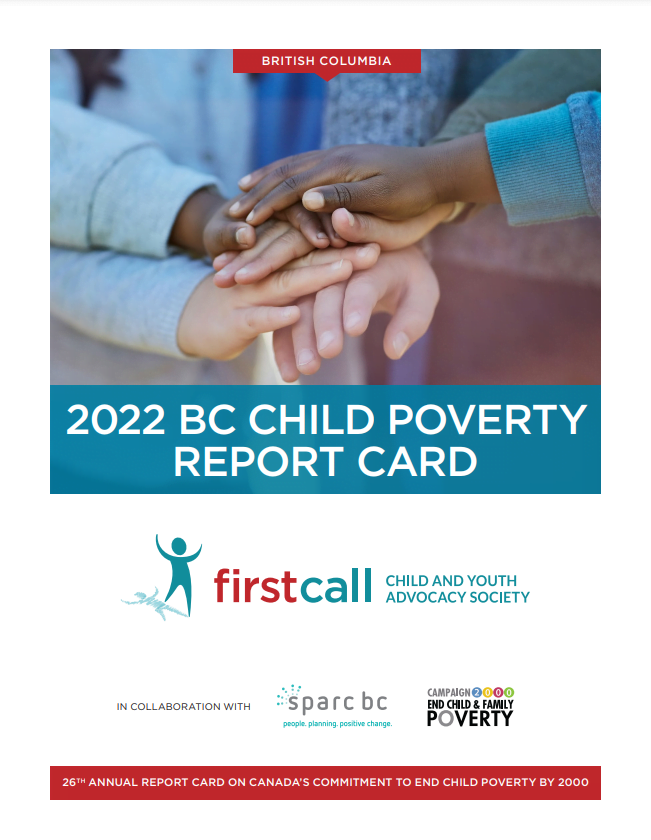10 search results
for
Public services
Targeted initiatives for groups over-represented in poverty data
Recommendation 13: Intensify efforts to help immigrants and refugees adjust to life in Canada by enhancing employment assistance, removing long-standing barriers to foreign-trained professionals accessing jobs in their field, making more language training with child care available, and improving employment standards and human rights protections and enforcement.-
Category and theme:
Groups affected:
Location of recommendation:
Lower barriers and improve lives through universal programs
Recommendation 15: Continue to prioritize new early learning and child care investments in 2023 budget and beyond to establish universal access to a system of high-quality, inclusive child care for BC children and families that has no parent fee for low-income families. Create enough licensed child care spaces for all who choose them. Ensure early childhood educators are paid compensation that reflects their education and the importance of the work they do by implementing a province-wide, publicly funded competitive wage grid for positions within the child care sector. Ensure there are adequate resources and support for the implementation of the Indigenous Early Learning and Child Care Framework.-
Category and theme:
Groups affected:
Location of recommendation:
Lower barriers and improve lives through universal programs
Recommendation 16: Increase program funding and support for families raising children with disabilities and complex medical needs to ensure they have timely, universal access everywhere in BC to a core suite of early intervention therapies; timely assessments; family respite; inclusive child care; health, medical and in-home supports.-
Category and theme:
Groups affected:
Location of recommendation:
Lower barriers and improve lives through universal programs
Recommendation 17: Increase investment in public health initiatives aimed to support maternal and parental health and healthy infant development, as well as non-barriered, free, community-based programs and services for all families with young children to ensure these supports are available throughout the province and designed to reach families experiencing poverty and other threats to their ability to thrive.-
Category and theme:
Audience:
Groups affected:
Location of recommendation:
Lower barriers and improve lives through universal programs
Recommendation 20: Ensure K–12 public education funding is sufficient to mitigate inequities between high- and low-income neighbourhoods, school districts and families and to ensure appropriate inclusion of students with diverse learning needs. This includes enhancing funding to school districts for special education assistants, arts programming, libraries, student support services, and deferred maintenance, among other areas that still require urgent attention in future provincial budgets. Schools need additional funds to implement public health response measures arising from the COVID–19 pandemic.-
Category and theme:
Audience:
Groups affected:
Location of recommendation:
Lower barriers and improve lives through universal programs
Recommendation 21: Create universal access to post-secondary education by eliminating tuition fees.-
Category and theme:
Groups affected:
Location of recommendation:
Lower barriers and improve lives through universal programs
Recommendation 22: Provide free public transit for minors ages 13 to 18 and free or reduced-fee transit access for low-income households.-
Category and theme:
Groups affected:
Location of recommendation:
Lower barriers and improve lives through universal programs
Recommendation 23: Work with industry to ensure lower income families and youth have access to technology (both hardware and Internet access) so that they are able to apply for financial assistance, learning opportunities and access other supports.-
Category and theme:
Groups affected:
Location of recommendation:
Lower barriers and improve lives through universal programs
Recommendation 24: Introduce universal coverage for all Canadians for prescription drugs, dental care, eye care, hearing aids, and assistive devices/products as essential aspects of health care.-
Category and theme:
Groups affected:
Location of recommendation:
Recommendation 25:
The CFLIM-AT is a broad, comprehensive, and relative measure of poverty. Replace the Market Basket Measure with the Census Family Low Income Measure After Tax (CFLIMAT), calculated with annual tax filer data, as Canada’s and BC’s official measure of poverty.
-
Category and theme:
Groups affected:
Location of recommendation:
